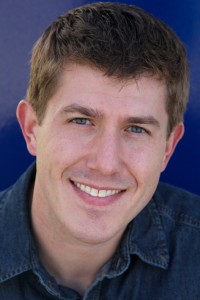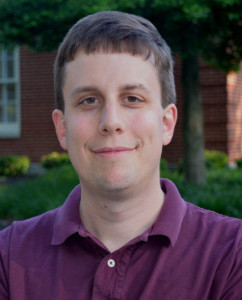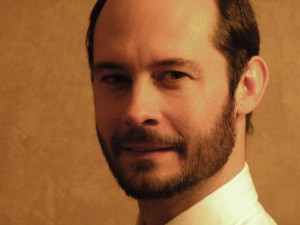“Come in, — come in! and know me better, man!” -Charles Dickens, A Christmas Carol
We’d love for you, our wonderful readers, to get to know us better. That’s why, each month, Kristin Luna will interview a member of The Fictorians. We’ll learn more about each member, such as their writing processes, their work, where they live, and what they prefer to drink on a cold winter’s day. We hope you enjoy this monthly installment of Meet the Fictorians.
Meet the Fictorians:
Evan Braun
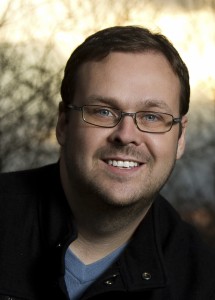
Kristin Luna (KL): Hi Evan! What are you drinking right now at this moment?
Evan Braun (EB): I am enjoying a cool, refreshing glass of Fresca, which is probably my favourite beverage of all-time. (I say “probably” because I go through phases; next week I might answer Diet Dr. Pepper, but I’ll be wrong. The real answer is Fresca.) While I’m on the subject of Fresca, one of my greatest frustrations in life is that in Canada we only have the original citrus-flavoured variety, whereas in the States you have access to the sweet ambrosia that is Peach Fresca and Black Cherry Fresca. Unfortunately, the folks at Coca-Cola, likely in conjunction with the Government of Canada, have decided we don’t deserve good things.
KL: Maybe Canada and the U.S. should come together and have the Fresca Peace Talks? I think you guys deserve some Peach and Black Cherry Fresca!
So, few people other than the Fictorians know this, but you were our intrepid leader since nearly the beginning. How many years exactly?
EB: The Fictorians started in March 2011 as a loose collective of bloggers. Though I was involved from the start, there was no leader per se. I gradually stepped into a leadership capacity about a year and a half later.
KL: What was it like in the beginning? How was the group The Fictorians formed?
EB: The original group of bloggers met in 2010 at the first annual Superstars Writing Seminar in Pasadena. The idea of forming a writing blog came about while we were nursing drinks at the hotel bar, which I think is how all convention-goers come up with their great ideas. We spent the next year in close communication, forming an accountability email list where we’d make weekly goals and report on our progress to each other. And then, almost exactly one year later, the Fictorians made its debut.
Like I said, there was no leader, and in fact we barely had any organization at all. We had a loose commitment to blog once a month, and to schedule our posts for certain days, but there was nobody to make sure any of this got done. We strived to post three days a week, which I think is a good goal at the start of an endeavour like this.
From there, our numbers grew, people came and went, and now we have a bona fide organizational structure undergirding the whole enterprise.
KL: You already let the cat out of the bag, so I don’t mind reminding everyone that you live in Canada. Do you draw inspiration for your writing from your surroundings?
EB: At this moment I’m looking out my window at a seemingly endless field, flat as three dimensions can produce, covered with at least a foot of snow—three or four feet where the snow has drifted—and the overcast and foreboding skies presage an imminent winter storm poised to dump another foot and a half. Once the snow starts to fall, everything will be white and I won’t be able to distinguish the horizon between ground and sky. Beautiful. And horrible. Definitely a mix of those two.
But do my surroundings inspire me? In a way, yes, I think they do. I’m currently working on a novel about a small colony on Mars, and its population and social structure is quite similar to the small town I actually live in. And of course, on Mars the colonies are isolated and the weather bitterly cold (albeit a lot drier than my prairie reality).
KL: If you couldn’t live in Canada, where would you live?
EB: I guess the easy answer might be… Hawaii?
The only other place I have lived is Huntsville, Alabama, for two and a half years, so I’ve had a good taste of the American south. As much as I enjoyed my time there, and made some of my very best friends, the experience only sweetened my appreciation of home. I guess the point I’m trying to make is that there was a time, when I was younger, when I wished I lived somewhere bigger, better, and busier than the quiet little place I’m from. I don’t feel that way anymore. And it turns out I really like quiet.
Not to make a joke or take this in a cosmic direction, but honestly, how strange and scary and life-changing and inspiring would it be to leave Earth and live on another planet, like Mars? Our generation is almost certainly going to see people do this in our lifetimes, which I think is just mind-boggling. So there you have it. It’s Canada or Mars for me!
KL: I hear you about someplace quiet. And Mars should be reeeeeeally quiet.
You have been busy with your series The Watchers Chronicle. Is the series complete?
EB: Yes, I’m finished that series now. It’s three volumes—The Book of Creation, The City of Darkness, and The Law of Radiance. The third book came out this past spring, and it’s done now. Of course, I reserve the right to go back to it at some point in the future. There are a number of nooks and crannies in that story which haven’t been told yet.
KL: What’s something important you learned about writing and/or about yourself while writing The Watchers Chronicle?
EB: My biggest lesson in writing was that it’s so much harder to finish something than it is to start it and keep it going. While I was writing the third book, I was flooded by one amazing cliffhanger idea after another. It would have been so easy to ramp up the story to an irresistible climax and then defer the endgame for another book—and I imagine I could have kept doing that for quite a number of volumes. Writing a satisfying and definitive ending is hugely difficult.
As for my biggest lesson about being a human being? Well, that would be related to the pains and joys of collaboration (I had a co-author), busting through creative logjams, and working through the difficult and painful process of making compromises.
KL: Speaking of pains and joys, what’s your ideal writing time look like?
EB: In the middle of the night. Being self-employed, I have the freedom to work any hours I choose—and by extension, write for whatever hours I choose. This means I usually get up around noon and go to bed around 4:00 a.m., with my prime writing time happening right at the tail end of that “day.” For me, nothing can beat those quiet, distraction-free hours.
KL: Any words of wisdom you’d like to impart on our readers?
EB: It’s nothing profound. I hear all the time that the one quality that sets really successful people apart from the rest of humanity is dogged determination. You just have to keep going, no matter what. Yes, make changes and adjustments when you hit a roadblock, but never stop. Because getting back up to speed and rebuilding lost momentum is a crushing weight.
KL: Second to last question, I swear, what is your favorite snack? (Crossing my fingers you’ll say Boy Bawang.)
EB: Kristin and I are both partnered to Filipino men, and as such have recently been introduced to the joys of Filipino cuisine. (Except balut, no thank you!) Now, I’m not sure “cuisine” is the appropriate term for a heavily salted deep-fried corn kernel, but anyway, that’s Boy Bawang for you. The best flavours are classic garlic, adobo, and butter.
KL: [Audible stomach growling]
EB: Well, to be honest, while that is the most recent snack to be added to my repertoire, I’m not 100% certain it’s my true favourite. I’ll probably never get over the simple, high-caloric pleasure of eating a bag of Doritos one chip at a time, sucking the last morsel of radioactive-orange nacho cheese into my gaping maw. Sorry, that got a bit gross.
KL: Not gross at all to this Doritos fan! I hope one day I get rich enough or get a really fancy grant or something to sleep on a bed of nacho cheese Doritos. I can just eat my way out of bed every morning, and fall into a crunchy bed every night.
ANYWAY. Final question: what is your favorite Fictorians post that you’ve written so far?
EB: This is an insidious question. Because I don’t recall, at this moment, any one post that I’m especially proud of, I had to go through each of them to refresh my memory. And it turns out I’ve written 67 Fictorian posts to date. So thanks, Kristin.
Well, because I took the time to peruse my entire Fictorians past (it turns out 2013 was a good blogging year for me), I’m going to provide my three favourite posts. Here goes.
3. “It Doesn’t Happen in a Straight Line”, September 2013. Here, I break down the many plateaus of my burgeoning writing career, and what I’ve learned from them.
2. “Making the Science Work: Freedom through Limitation”, March 2013. In this post, I examine the relationship between science reality and storytelling convenience.
1. “Platonic Relationships in Fiction (a.k.a. ‘The Glue’)”, February 2013. I remember struggling mightily to come up with a good blog idea for Romance Month, so I waited until the last minute. And then this came out, and it’s my clear favourite.
If you have any questions for Evan, please leave a comment below. Thank you for reading!
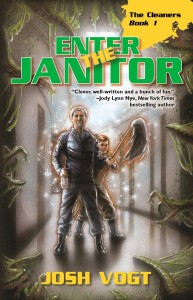 Last year marked the launch of my urban fantasy series, The Cleaners, with Book #1: Enter the Janitor. The novel focuses on two main characters, Ben and Dani, as they work for a supernatural sanitation company dedicated to protecting the world from magical muck and Corruption (yes, with a capital C).
Last year marked the launch of my urban fantasy series, The Cleaners, with Book #1: Enter the Janitor. The novel focuses on two main characters, Ben and Dani, as they work for a supernatural sanitation company dedicated to protecting the world from magical muck and Corruption (yes, with a capital C).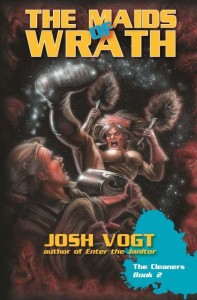 Now, since Enter the Janitor came out, readers have told me how they see parts of themselves, their friends, or family members in Dani’s antics. She’s not just a reader vehicle. She resonates for some. She makes others laugh. She’s even made a few people worry for her sanity. And I look forward to finding new ways for her to surprise not only me, but everyone who might’ve grown the slightest bit fond of this spitfire.
Now, since Enter the Janitor came out, readers have told me how they see parts of themselves, their friends, or family members in Dani’s antics. She’s not just a reader vehicle. She resonates for some. She makes others laugh. She’s even made a few people worry for her sanity. And I look forward to finding new ways for her to surprise not only me, but everyone who might’ve grown the slightest bit fond of this spitfire.
